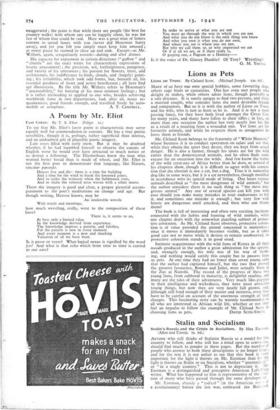Lions as Pets
Lions on Trust. By Cleland Scott. (Michael Joseph. 12s. 6d.)
MANY of us have our own special hobbies, some favouring dogs, others cage birds or carnations. One has even met people who delight in snakes, while others adore lions, though generally at a safe distance. It is surely unique to find two persons, and those a married couple, who consider lions the most desirable friends and companions. But so it is with the author of Lions on Trust, and his wife, who is just as keen as he is. And it is not a mere passing fancy, for they have both lived amongst the Great Cats for many years, and many have fallen to their rifles ; in fact, on more than one occasion the author has very nearly lost his life as a result of a mauling from a wounded one. Yet lions are his favourite animals, and while he respects them as antagonists he loves them as friends.
Mr. Cleland Scott belongs to the fraternity of " White Hunters," whose business it is to conduct sportsmen on safari and see that, while they obtain the sport they desire, they are kept from actual danger. He is also a farmer, though his tastes are for the wild rather than the domesticated animals, and he often finds some excuse for an excursion into the wilds. And few know the habits of the wild creatures of Africa better than he does, as several of his chapters show, though it is difficult to agree with his conten- tion that the cheetah is not a cat, but a dog. True it is somewhat dog-like in some ways, but it is a cat nevertheless, though modified in accordance witn its special mode of living. One hears various animals described as " the most dangerous of wild animals," but the author considers there is no such thing as " the most dan- gerous animal." Any one of several species can kill you with ease should you make many mistakes in your endeavours to kill it, and sometimes one mistake is enough ; but very few wild beasts are dangerous until attacked, and then who can blame them?
The book is full of interesting and often very exciting incidents connected with the habits and hunting of wild animals, while one chapter deals with the somewhat puzzling subject of protec- tive coloration. As Mr. Cleland Scott observes, protective colora- tion is of value provided the animal concerned is motionless ; once it moves it immediately becomes visible, but as it takes good care not to move while it desires to remain unobserved, its protective coloration stands it in good stead.
Intimate acquaintance with the wild lions of Kenya in all their moods produced in the author a great admiration for the species, and, strangely enough, his wife was of his way of think- ing, and nothing would satisfy this couple but to possess lions as pets. At one time they had no fewer than seven young cubs that the author had captured himself, but the two that proved the greatest favourites, Romeo and Juliet, were actually born in the Zoo at Nairobi. The record of the progress of these two young lions, from cubhood to maturity, is delightful reading, and many are the tales of their adventures. Very much like. puppies in their intelligence and wickedness, they were most attractive young things, but now they are very nearly full grown, and, although still fond enough of their master and mistress,-even they have to be careful on account of the enormous strength of their charges. This fascinating story can be warmly recommended to all who are interested in African wild life, whether or not they feel an impulse to follow the example of Mr. Cleland Scott In


























 Previous page
Previous page